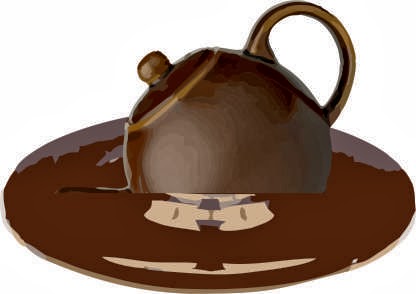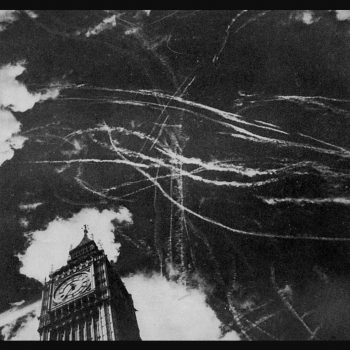We are developing the social individualist meta-context for the future. From the very serious to the extremely frivolous... lets see what is on the mind of the Samizdata people.
Samizdata, derived from Samizdat /n. - a system of clandestine publication of banned literature in the USSR [Russ.,= self-publishing house]
|
From Instapundit (my emboldenings):
The miniature Perdex drones, different from larger, more common remotely piloted vehicles (RPVs) like the well-known Reaper and Predator, operate with a high degree of collective autonomy and reduced dependency on remote flight crews to control them. The large group of more autonomous Perdex drones creates a “swarm” of miniature drones. The swarm shares information across data links during operation, and can make mission-adaptive decisions faster than RPV’s controlled in the more conventional manner.
In a statement released by the U.S. Department of Defense, Strategic Capabilities Office Director William Roper said, “Due to the complex nature of combat, Perdix are not pre-programmed synchronized individuals, they are a collective organism, sharing one distributed brain for decision-making and adapting to each other like swarms in nature,” Director Roper went on to say, “Because every Perdix communicates and collaborates with every other Perdix, the swarm has no leader and can gracefully adapt to drones entering or exiting the team.”
Doctor Who fans will know exactly where this sort of thing leads:

You have been warned.
The investigative reporters at Bellingcat have produced a very interesting report on the Russian war against Ukraine, including many incidences of the Russian army firing artillery across the international border in 2014.
To be honest, if his colourful quotes were intended to alarm me, they actually had quite the opposite effect.
“Be polite, be professional, but have a plan to kill everybody you meet.”
– James Mattis
May the Great God, whom I worship, grant to my country and for the benefit of Europe in general, a great and glorious Victory; and may no misconduct in any one tarnish it; and may humanity after Victory be the predominant feature of the British Fleet. For myself, individually, I commit my life to Him who made me, and may His blessing light upon my endeavors for serving my Country faithfully. To Him I resign myself and the just cause which is entrusted to me to defend. Amen. Amen. Amen.
– The prayer of Horatio Nelson, commander of the British fleet, written on the eve of the Battle of Trafalgar, the following day. For those interested in this period of naval warfare, I strongly recommend this excellent book by Sam Willis.
Roger Knight’s excellent biography of Nelson, which I read about three years’ ago after it was published, is also a brilliant study of the man. (Being an East Anglian, as Nelson also was, I am somewhat biased.)
I leave it to Samizdata readers to elaborate on the potential parallels between Nelson’s destruction of the French/Spanish fleets on that day and the recent far less violent assertion of UK independence on 23 June, 2016.
On 15 September 1916 tanks made their debut at Flers-Courcelette, one of the many engagements which took place during the Battle of the Somme.
The battle marked the beginning of a sorry chapter in British military history because the truth – a truth that to this day few seem prepared to acknowledge – is that the First World War tank was useless.
The list of its failings is lengthy. It was slow, it was unreliable, it had no suspension and it was horrible to operate. The temperature inside was typically over 100°F and as exhaust gases built up so crew effectiveness collapsed. It was also highly vulnerable. Field artillery could take it out easily. Even rifle ammunition could be effective against it. While normal bullets might not be able to penetrate the armour they could knock off small pieces of metal from the inside – known as spall – which then whizzed round the interior wounding all and sundry.
That the tank was the brainchild of Winston Churchill from his days as head of the Admiralty should have alerted senior commanders to the possibility that it was yet another of his crackpot schemes. But they persisted. For his part, Haig being a technophile put a huge amount of faith in the new invention. His diary is littered with references to the tank and he seems to have made great efforts to secure ever more of them. In consequence, huge amounts of effort went into a technological dead end when it would have been far better spent on guns, shells and fuzes.
Not that such efforts were ever likely to satisfy the snake-oil salesmen who made up the ranks of the tank enthusiasts. In the face of tank failure after tank failure they simply claimed that their beloved weapon just wasn’t being used properly.
Of course, like all good conmen they liked to take credit for other people’s successes. So, when a huge number of tanks were used at Cambrai in 1917 and the initial phases went reasonably well they were happy to put it all down to the tank. The fact that within 3 days an initial tank force in the hundreds had been whittled down to single figures by mechanical failures and withering German artillery fire was glossed over.
The credit should really have gone to the “predicted barrage”. As with so much to do with artillery this needs a little explaining. If your artillery barrage is to be effective you need to know where your shells are going to land. Although manufacturers attempt to build guns with uniform characteristics this is an extremely difficult thing to do. Worse still every time a gun is fired the barrel experiences wear and its characteristics change. Before Cambrai the answer had been “registration”. Guns would fire shells at the enemy and observers would spot where they landed. The drawback was that the enemy could tell that an attack was on its way. In a predicted barrage the gunners worked out in advance where the shells would land so the first the enemy would know about an attack was when he was hit by a full-scale barrage. This meant that for the first time since the beginning of the war surprise could be re-introduced to the battlefield.
 Cheaper than a Great War tank and about as useful.
World order be damned for a corollary to world government, and I expect the waters of the world are not a problem to police if one returns to the policy of hanging pirates instead of playing catch-and-release.
– Commenter ‘Erik‘
… Croatia’s Operation Storm was in day two of a rapid offensive to recapture the bulk of its territory from Belgrade backed separatists. It was the largest European land battle since the Second World War, ending on 7 August 1995 with the reoccupation of 4,000 square miles of territory. This was a dramatic demonstration of how effective the Croatian Army (HV) had become compared to just a few years earlier, and Operation Storm also represented a strategic victory for the Bosnian government as it broke the long siege of the Bihać enclave.
Like all wars, it was not pretty, but it ended as it started, as an ethnic struggle with winners and losers and there is no point in thinking otherwise, and the less bad guys won in my opinion.
Although Op. Storm did not end on August 5th, many Croatians see the HV recapture of Knin on this date as the most symbolic. It feels strange to me to tag this as ‘historical views’ as saw a great deal of that war first hand. I am getting old 😀
One of the arguments I occasionally hear is that the European Union has been an important force for peace in Europe following the Second World War and that further, the weakening of the EU as a result of UK departure will embolden enemies of Western Europe, such as Putin. However, here’s a thing: it was arguably the decisive defeat of Nazi Germany, and the determination of the NATO powers, led by the US, to contain the Soviet Union and combat forms of anti-West subversion, that was more important in keeping the peace. The EU was in my view part of the overall architecture of what the Western powers put together, but whether it was decisive is unproven at best.
And the the various missteps of the EU after the Berlin Wall came down have seriously reduced rather than increased the EU’s status as a stabilising, pro-peace, force. The greatest misstep of all was launching a single, fiat currency without full, democratically accountable political union. (I would not have objected to a common, hard-money system for those who wanted it, but that was never the aim of the European Union’s most ardent federalists.)
I can understand why leaders such as Margaret Thatcher (until the late 80s) regarded membership of the EU as one of those dues that had to be paid to keep the West together and why she fretted that it was becoming more of a problem towards the end of her time in office.
It should not be forgotten that during the 60s, under the Presidency of Charles De Gaulle, France withdrew itself from the command structure and active operations of NATO. Leave aside the reasoning behind it: you have a large, relatively strong Western European country leaving one of the main transnational groupings of the post-war era, a couple of decades before the Berlin Wall came down and before the end of Communism. But I hardly ever hear France getting heat for this. Maybe I read the wrong journals and websites.
It is worth remembering this episode if one ever hears a French commentator or politician bashing the UK for somehow “weakening the West” for getting out of an organisation that it did not like. Because France did leave an important group, but the sky did not in the end fall in.
After writing his three great novels — The Spy Who Came in From the Cold, Tinker Tailor Soldier Spy and The Perfect Spy — it is easy to agree with the conclusion ofPrivate Eye’s critic, who said le Carré had become “his own tribute band”. You know now how his books will go. There is a decent Englishman. He comes across skulduggery. He is persuaded to fight it by an honest spy, who teaches him tradecraft, but instead finds he must fight Western corporations and governments whose cynicism knows no limits. In the case of The Night Manager, the reason, of course, why the British government is unconcerned by illegal weapons sales is that MI6 is in the pay of the villainous arms dealer.
– Nick Cohen, reviewing the recent TV adaptation of The Night Manager.
For what it is worth, although I like the George Smiley books and also enjoyed A Small Town in Germany, a lot of Le Carré’s other material is as Cohen describes it.
Here is a nice appreciation of the George Smiley books, which in my view are still riveting reading, all these years’ later.
Ah yes, Britain’s socialists, working tirelessly towards a world in which Vladimir Putin, Xi Jinping & Kim Jong-un are the only people with nuclear weapons. What could possibly go wrong with that?
|
Who Are We? The Samizdata people are a bunch of sinister and heavily armed globalist illuminati who seek to infect the entire world with the values of personal liberty and several property. Amongst our many crimes is a sense of humour and the intermittent use of British spelling.
We are also a varied group made up of social individualists, classical liberals, whigs, libertarians, extropians, futurists, ‘Porcupines’, Karl Popper fetishists, recovering neo-conservatives, crazed Ayn Rand worshipers, over-caffeinated Virginia Postrel devotees, witty Frédéric Bastiat wannabes, cypherpunks, minarchists, kritarchists and wild-eyed anarcho-capitalists from Britain, North America, Australia and Europe.
|






